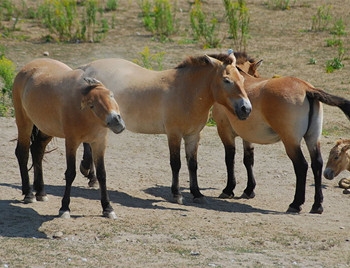
But there is a problem with the idea that hunting caused the mass extinction. Mammoths were not the only animals to disappear.
但是狩獵帶來的一個(gè)問題是大量物種的滅絕,猛犸象并不是唯一的消失的動(dòng)物。
Camels survived for millions of years in North America, but disappeared around the same time as the mammoths. Wild horses first evolved here and became dominant grazers. Yet they, too, vanished soon after the Ice Age ended. But there’s little evidence to suggest that humans hunted horses or camels. This seems to go against the hunting argument.
駱駝在北美洲生存了上百萬年,但是也和猛犸象大約同一個(gè)時(shí)間消失了,野馬首先在這里代代繁衍,并主宰了這里的草地,然而不久他們也隨著冰河時(shí)代結(jié)束而滅絕了,但是幾乎沒有證據(jù)可以表明人們狩獵過馬匹和駱駝,這似乎與狩獵規(guī)則不符。
So what else would have triggered such large-scale extinctions?
那么還有其他的因素可以觸發(fā)這種大規(guī)模的滅絕嗎?
The other major possibility is climate change. The end of the Ice Age was a turbulent, erratic period. In some areas, rain patterns were shifting, bringing moisture back to dry landscapes and turning grassland into forest.
另一種主要的可能性是氣候的變化,冰河時(shí)代末期是個(gè)動(dòng)蕩流離的時(shí)期,在一些地區(qū),降雨發(fā)生了改變,很多干燥的地區(qū)變得濕潤,草地變成了森林。
Other regions of the continent were plunged into prolonged periods of draught. For grazers such as horses, this led to a massive change in habitat, one they were not flexible enough to overcome.
北美大陸的其他地區(qū)仍然陷于長期的干旱,像野馬這樣的食草動(dòng)物,它們的棲息地發(fā)生了大規(guī)模改變,而他們并沒有足夠的能力來適應(yīng)這些改變。
As the land dried out, many grass eaters disappeared. We may never know for certain what killed off most of the larger animals at the end of the Ice Age. We do know that there was a time of coincidence—people were arriving just as the climate was in a state of change. Both may have played their part. Whichever was responsible, more than 70 species vanished for good, but some large animals did survive and still live here today.
隨著陸地的干旱,大量食草動(dòng)物滅絕,冰河時(shí)代末期為什么大多數(shù)大型動(dòng)物滅絕,這對于我們來說,可能永遠(yuǎn)是個(gè)不解之謎。但我們可以肯定的是一個(gè)時(shí)間巧合,人類達(dá)到大陸的時(shí)候也正是氣候改變的時(shí)候。兩者可能都起了一定的作用。不管到底誰是動(dòng)物滅亡的罪魁禍?zhǔn)祝?0多個(gè)物種都永遠(yuǎn)地滅絕了,但是如今仍有一些大型動(dòng)物存活至今。
英文文本來自普特英語,譯文屬可可原創(chuàng),僅供學(xué)習(xí)交流使用,未經(jīng)許可不得轉(zhuǎn)載。











